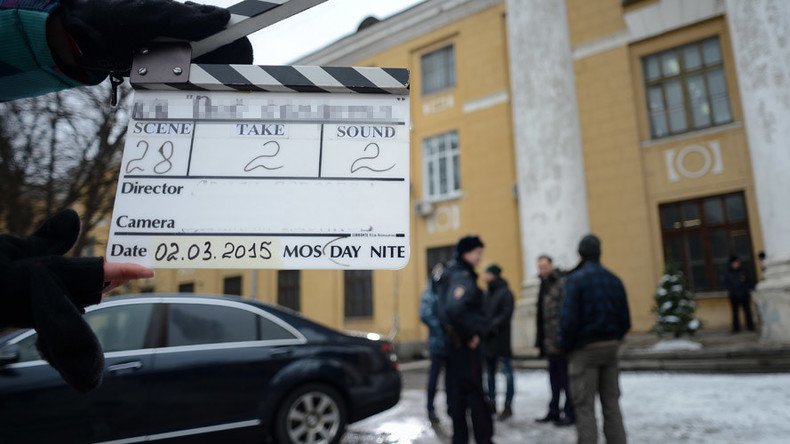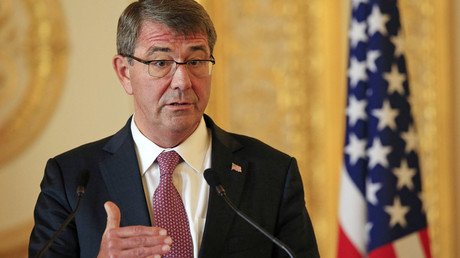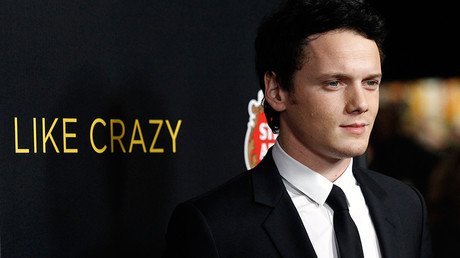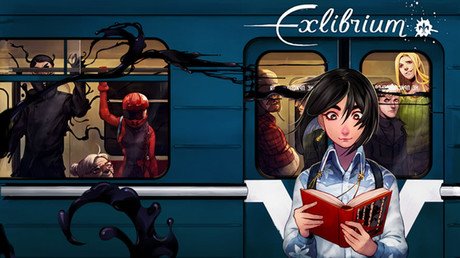Oh look, there's another Russian baddie!

The BBC have made a new film of the classic 1930 children’s novel Swallows and Amazons, and you'll probably not be surprised to know who the new baddies are.
Arthur Ransome’s book, set in England’s beautiful Lake District region, was about the outdoor adventures of two families of children. But the 2016 adaptation has introduced two new characters to the story. And guess what? They’re Russian spies!
What makes the tampering with the original text all the more objectionable is that Arthur Ransome himself was a Russophile, and an admirer of a certain Vladimir Lenin. Swallows and Amazonsand Shady Soviet Spies? Red Arthur, who shared a flat with Radek and who married Trotsky’s secretary, must be turning in his grave.
The makeover of Swallows and Amazons is only the latest example of Russian baddies being wheeled out in new film and television productions. Since 2013, when, purely coincidentally, Russia became official enemy number one for the western Establishment by blocking plans for regime change in Syria, we’ve had a glut of productions featuring diabolical, sinister Russkies.
At the same time in book publishing, a spate of anti-Russia/anti-Putin titles have appeared and been aggressively promoted (and done very well when it comes to winning literary prizes). Anyone who arrived back in Britain from a few years abroad could be forgiven for thinking that we’re being prepared for a major war. It’s hard to escape from all this Russophobia. It hits us when we switch on the TV to watch ‘mainstream’ channels, go to the cinema or pop down to our local bookshop, where we’re likely to see books with subtle titles like 2017 War with Russia: An Urgent Warning from Senior Military Command, by General Sir Richard Shirreff, prominently displayed.
On the telly, it’s not just the Russian spies in Swallows and Amazons we've got to look forward. There’s a new production of Joseph Conrad’s The Secret Agent. In the original 1907 novel it is only implied that agent provocateur Adolf Verloc is working for the Russian government. But the new production - it seems - will leave us in no doubt as to who's behind the devilish plot to bring terror to London.
"Produced by Line Of Duty's World Productions for BBC One, (Toby) Jones will play Verloc, whose seedy Soho shop hides his role as an agent of the Russian Embassy, spying on a group of London anarchists. Furious that Britain tolerates violent extremists, the Russians want Verloc to provoke a bomb outrage that will trigger a government crackdown," the BBC informs us.
Those dastardly Russians! Not only have they ‘invaded’ Ukraine and helped keep the ‘evil Assad’ in power in Syria, they also organized the blowing up of the Greenwich Observatory! Let’s impose even more sanctions on Moscow!
It was only last year that BBC screened a new adaptation of Agatha Christie’s Partners in Crime. The first series, The Secret Adversary, involved a hunt to unmask 'Mr Brown’, 'a legendary Soviet assassin’. The second series, N or M? involved - you'll never guess - a hunt for a Soviet spy. The original Agatha Christie novel, it's worth pointing out, involved a hunt for a Nazi agent and not a Soviet one. Again, we’ve got a text being altered to reflect current establishment obsessions.
It’s not only in Britain where dramas with Russians as the baddies are in vogue. It seems to be the norm elsewhere in NATO-land. Last autumn, Okkupert (Occupied), a drama depicting a future Russian invasion of Norway, premiered on Norway’s TV 2 channel. The budget for the series was 90m kr ($11m) making it the most expensive production in Norwegian television history. It goes without saying that the UK is one of the countries which Okkupert has sold to. The Baltic States have also bought it. That will do a lot to ease tensions with Russia, won’t it?
The Russians, quite justifiably, feel offended by this very cold piece of cold war propaganda. The Russian Ambassador to Norway noted that it was the 70th anniversary of the Red Army’s victory over the Nazis that involved the liberation of Northern Norway from the Germans. In fact just a year earlier King Harald V had paid tribute to the Red Army, saying:
“Norway has never forgotten, and will never forget, the contribution our Russian neighbor gave to our freedom. Many hundred Soviet soldiers fell in the battles in Eastern Finnmark in the autumn of 1944. Of the nearly 100.000 soviet prisoners of war that were sent to Norway, more than 13.000 died, and are resting in Norwegian soil.”
How grotesque then that the program makers at TV 2 choose to mark the anniversary of the end of World War II by producing a drama which cast their country’s liberators as invaders. What’s the Norwegian word for ‘ingratitude’? It certainly applies here.
Needless to say, neocon commentators and professional Russia-bashers are big fans of the series. "Occupied is disturbingly relevant in light of the Ukraine crisis. Ignore what the Kremlin tell you, and set aside 10 hours to enjoy this timely show", wrote one Fellow of the Foreign Policy Initiative.
Then of course there’s those vintage Russia-bashers in Hollywood. The big picture studios have been presenting us with Russian baddies for years - although they did lay off a bit when détente was at its peak in the mid-late 1970s (then we had films like ‘Meteor’ in which a U.S. scientist played by Sean Connery and a Soviet scientist played by Natalie Wood, worked together to save the world), and also in the Yeltsin era.
In the last few years, however, Russian villains have returned with a vengeance.
In the made-for-TV series The Americans, created and co-written by former CIA officer Joe Weisberg, KGB agents pose as all-American citizens. In Jack Ryan: Shadow Recruit, released in 2014, a covert CIA agent uncovers a devilish plot by a ’patriotic’ Russian oligarch (played by the film’s director Sir Kenneth Branagh) to destroy the US economy with a terrorist attack. "If love of country also involves hatred and attack on other countries, surely we need to redefine what patriotism is," said Sir Kenneth. Has he heard of the Iraq war, I wonder? Or the bombing of Yugoslavia? Or the destruction of Libya?
The 2015 film Child 44 focuses on the brutality of the Stalin era - and features the hunt by a ‘disgraced’ security officer for a serial child murderer. The November Man,The Equalizer and John Wick are just three more recent films with Russian baddies.
"With the triple threat of The November Man, The Equalizer and John Wick, Russomafiaphobic cinema is coming to the fore. The premise of these movies is always the same: nothing, but nothing, could be scarier to moviegoers than Russian gangsters", writes film critic Joe Queenan.
Film makers used to think that nothing could be scarier to us than Frankenstein’s Monster and blood-sucking vampires. Now it's Ivan the Terrible Mobster.
By way of explaining the current wave of Russophobic cinema, the New York Times’ Steven Kurutz says: "I suspect screenwriters and studio executives have deemed Russians to be politically safe villains. No advocacy group will protest. No foreign distribution deal will be nixed".
Institutionalized, self-perpetuating, establishment group-think also helps explain why there are so many Russian villains around at the moment - on our TV screens, in books and at the pictures.
The people who own the big publishing houses and who decide what gets published by them, the people who run the big TV companies, and the people who own and run big film studios are, with only a few exceptions, part of the Establishment.
The dominance of monopoly capitalism in the West means that sometimes TV companies, publishing houses and film studios are under the same ownership.
Rupert Murdoch’s family media empire for instance doesn’t just include neocon newspapers and television companies but Harper Collins, one of 'The Big Five’ British publishing houses, and film-maker 21st Century Fox. It was the 21st Century Fox owned FX TV channel which co-produced and networked The Americans.
Another of publishing's ‘The Big Five’, Penguin Random House, is majority-owned by Bertelsmann, owner of the RTL group.
Britain's opponents would love to cause mischief if we left the European Union. Read my latest article @Telegraphhttps://t.co/AUX9kbBxRa
— William Hague (@WilliamJHague) June 21, 2016
With Russia regarded as an ‘opponent’ by the political elite in the west, its hardly surprising that influential people in the worlds of publishing, broadcasting and entertainment see the country in the same way too. It’s also probably a good career move too to play along with the game.
Commission a new drama or film or book which has a Russian hero and a baddy working for a NATO country- and you’d be likely to smeared by modern McCarthyites as a ‘Putin stooge' and/or a ‘Kremlin propagandist'. Given the current climate it’s long odds against that such a production would even get off the ground - and its even longer odds that it would be shown on prime time TV. If it’s a book we’re talking about, you could forget about it winning a top literary prize, or even being long-listed for one.
But is it all this Russia-bashing actually changing attitudes?
A recent poll from Pew Research showed that ‘tensions with Russia’ is way down the list of people’s concerns in Europe. In Britain, there’s just a 1-point gap between the people who think ‘being tough’ on Russia is more important than having ‘a strong economic relationship with Russia’. The results indicate that despite all the Russian baddies we see-and all the anti-Russian propaganda we're subject too-ordinary people are not buying into it in the way their governments would no doubt want them to.
Television and film critics also seem to be getting bored of Russian baddies too.
The Daily Mail's Brian Viner says that the "bizarre makeover" of Swallows and Amazons to include "a preposterous pair of Russian spies" has robbed the work "of much of its charm".
In the Telegraph, Gerard O’Donovan bemoaned the fact that Agatha Christie’s anti-Nazi mystery N or M had been "needlessly diverted to the Fifties and turned into a lukewarm Cold War thriller".
While in the US, Steven Kurutz, admits that having Russian villains "doesn’t make for as powerful drama as it once did."
Despite this, it’s highly likely the wave of Russophobic productions will continue. So long as the Western political establishment regard Russia as an ‘opponent' - television, the film industry and book publishing will follow suit. In the meantime, keep looking out for those Russian spies in the Lake District.
Follow Neil Clark on Twitter @NeilClark66
The statements, views and opinions expressed in this column are solely those of the author and do not necessarily represent those of RT.
















